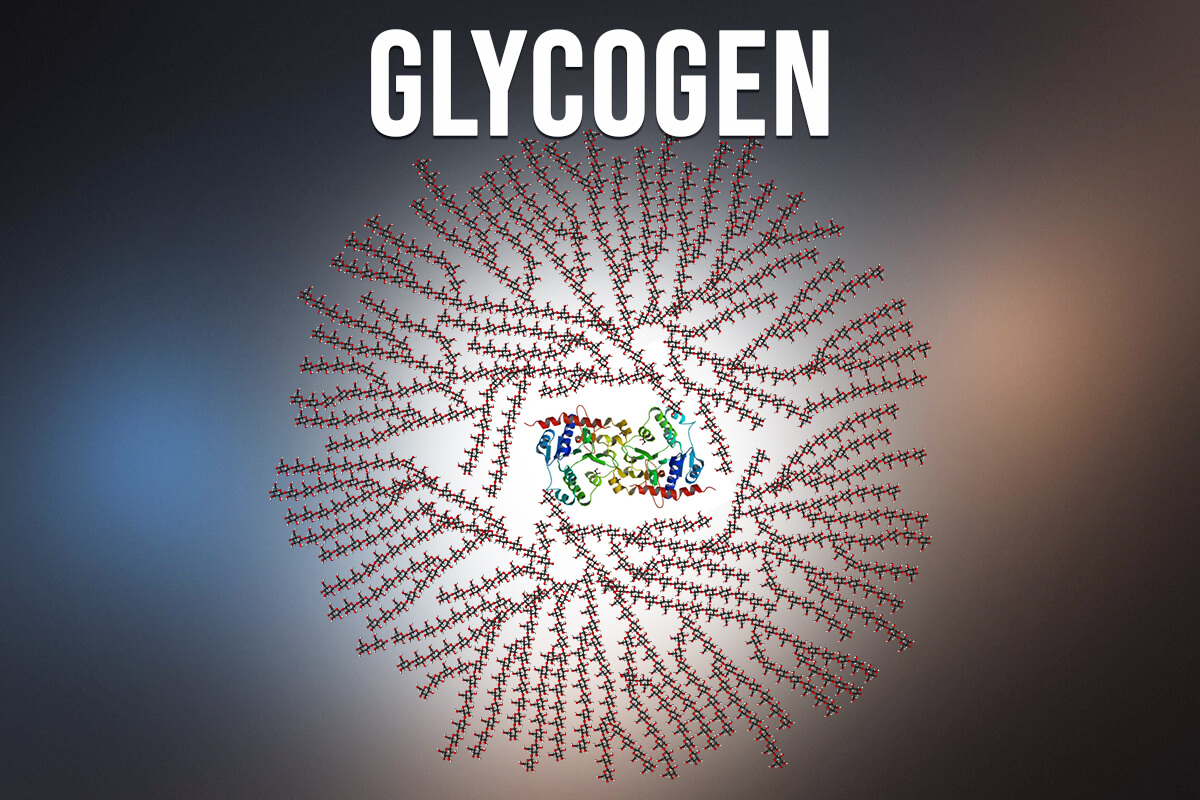Most people know about the three macronutrients protein, carbohydrates, and fats. But seldom does an average gym-goer or weightlifter know about glycogen and its functionalities.
And if you want to maximize your gains and strength, you need to know more than just the basics of nutrition. But don't worry, we have got you covered, and this article will be discussing how glycogen helps fuel your workouts and how you can maximize glycogen synthesis to reach your potential in the gym.
So, let us get to the point.
What is Glycogen?

When we eat carbohydrates, our body changes them into a sugar called 'glucose' that can be used for energy. The glucose, in turn, is changed to glycogen, a form of sugar that our muscles and liver can easily store.
It is the predominant storage form of glucose and carbohydrates in humans. So, in short, glycogen is a form of stored energy in the body.
It is estimated that our body stores around 2000 calories worth of energy as glycogen. It is stored mainly in two places - muscles and the liver. Other organs can use glycogen stored in the liver, whereas glycogen stored in the muscles is not shared and only used by the muscle cells and tissues.
In this article, we will primarily focus on muscle glycogen and how it might impact your training and performance.
What is Glycogen Synthesis and why is it Important?

Glycogen synthesis refers to the process of creation and storage of new glycogen granules. It is also known as 'glycogenesis.' When you eat a meal, your body breaks down the macros into smaller molecules. For example, protein is broken down into amino acids; fats are broken down into triglycerides and further down into glucose. Your body can store about 4 grams of glucose in the bloodstream at any time, and if the levels rise too far from this range, it could damage the nerves, blood vessels, and other tissues.
Therefore, to prevent this from happening, your body uses several mechanisms to pull out the glucose from your bloodstream. In the liver, glycogenesis takes place to dispose of this extra glucose into the liver cells and muscle tissues. And in future, when your body needs excess glucose, it can reverse the process and convert these granules into glucose for bodily use.
Benefits of Glycogen for Body Composition
You must have heard many people saying that eating too many carbs will likely increase body fat percentage and result in poor body composition. Also, many consultants and trainers state that carbohydrates won't help you build muscle mass and strength. These statements are all fallacious with no scientific backing.
Here is how glycogen can help you build your dream physique by enhancing your overall performance:
Higher glycogen levels would enable you to train harder at the gym. You grow muscles when you follow a process of progressive overload, which means increasing the amount of stress or tension on your muscles over time. The best way to achieve this is by doing more sets and reps or lifting heavier weights than before. This is the kind of training that bodybuilders and weightlifters follow to increase muscle mass and performance. But this kind of training depletes the glycogen tanks of your body very rapidly, and it might affect your weightlifting performance. Therefore, having enough glycogen reserves in the body could help build more muscles over time and improve your body composition.

When it comes to building muscles, how fast you recover is as important as your training performance. It is found out that maintaining a high level of glycogen level in your body helps in improving the post-workout healing of your muscle tissues. Intense training leads to increased circulating catabolic hormones to facilitate the breakdown of glycogen and fat for fuel. These hormone levels remain high after exercise and continue to break down muscle tissue. Therefore, eating carbohydrates can decrease muscle protein breakdown by stimulating insulin release and replenishing the glycogen stores.
If you cut down on your carb intake, then you tend to deplete your glycogen levels. In this case, you'll perform poorly in your workouts, recover slower, and likely lose some strength and muscle mass, which would make it difficult to achieve the body composition you want. Therefore, it is best to replenish your glycogen levels by consuming an appropriate amount of carbs and maintaining your muscle mass to achieve your dream physique.
Signs of Low Glycogen Level
Increase Muscle Fatigue

Low levels of muscle glycogen often result in higher levels of muscle fatigue during a session. However, this can be remedied relatively quickly by ingesting fast carbohydrates and close attention to nutrition.
Decreased Power Output

Since carbohydrates are the preferred energy source for skeletal muscles, having low glycogen levels could limit one's ability to produce the maximum power possible during workouts. In addition, with decreased levels of muscle glycogen, there is an increase in muscle fatigue and the inability to promote fast, forceful muscle contractions.
Lack of Recovery

Serious strength athletes need to replenish used muscle glycogen levels after hard training for multiple reasons, including: -
- Boost insulin sensitivity.
- Stimulate muscle protein synthesis.
- Prepare your body for upcoming training sessions in the day/week.
- Limit the muscle damage due to training.
Long story short, without adequately addressing low levels of muscle glycogen after intense training, you can run the risk of depleting energy reserves within muscle tissues and limiting protein synthesis necessary for muscle growth.
How to Increase Your Glycogen Levels?
For weightlifters who are training hard with high volumes and are highly competitive athletes, muscle glycogen optimization can be a crucial contributor to sports performance and muscle growth. Therefore research suggests that increased carbohydrate consumption after strenuous training sessions/events can significantly improve muscle function and aerobic performance in subsequent training bouts In terms of consumption, research suggests that consuming 0.8g of carbohydrate per kilogram of body weight post-workout session can maximize glycogen and help the muscle tissues to recover for optimum growth and performance.
The Bottom Line
Glycogen serves several vital functions in your body. From providing you with the energy to do daily tasks to lifting heavyweights in the gym, they are the primary fuel source for your body. Therefore, make sure you eat enough good carbs throughout the day to keep your glycogen stores replenished to perform your best in the training sessions.
References
van Loon, L. J., Saris, W. H., Kruijshoop, M., & Wagenmakers, A. J. (2000). Maximizing post exercise muscle glycogen synthesis: carbohydrate supplementation and the application of amino acid or protein hydrolysate mixtures. The American Journal of Clinical Nutrition,72(1), 106–111. https://doi.org/10.1093/ajcn/72.1.106
Murakami, T., Shimomura, Y., Fujitsuka, N., Sokabe, M., Okamura, K., & Sakamoto, S. (1997). Enlargement of glycogen store in rat liver and muscle by fructose-diet intake and exercise training. Journal of Applied Physiology, 82(3), 772–775. https://doi.org/10.1152/jappl.1997.82.3.772
IVY, J. L., & KUO, C. H. (1998). Regulation of GLUT4 protein and glycogen synthase during muscle glycogen synthesis after exercise. Acta Physiologica Scandinavica,162(3), 295–304. https://doi.org/10.1046/j.1365-201x.1998.0302e.x





